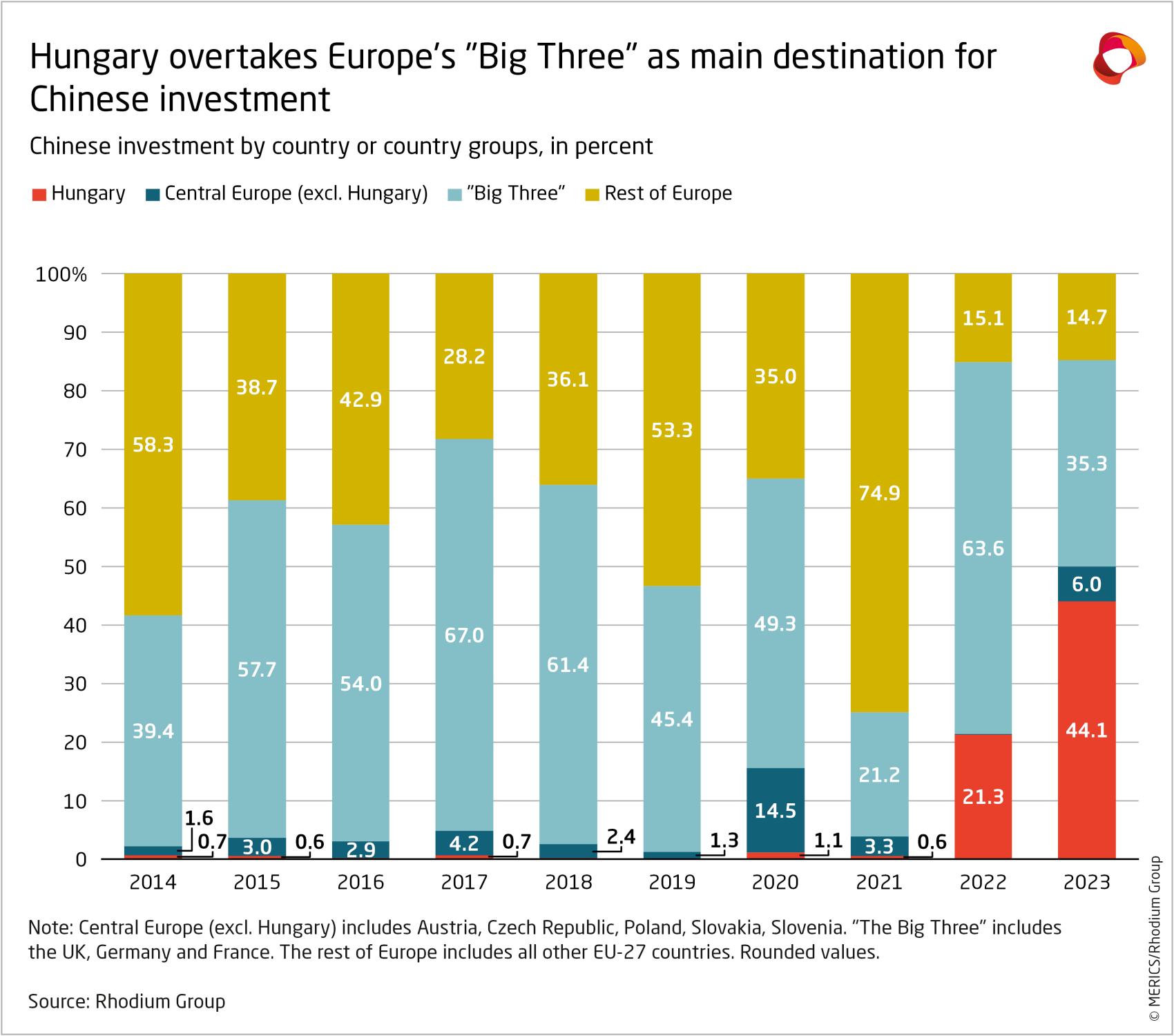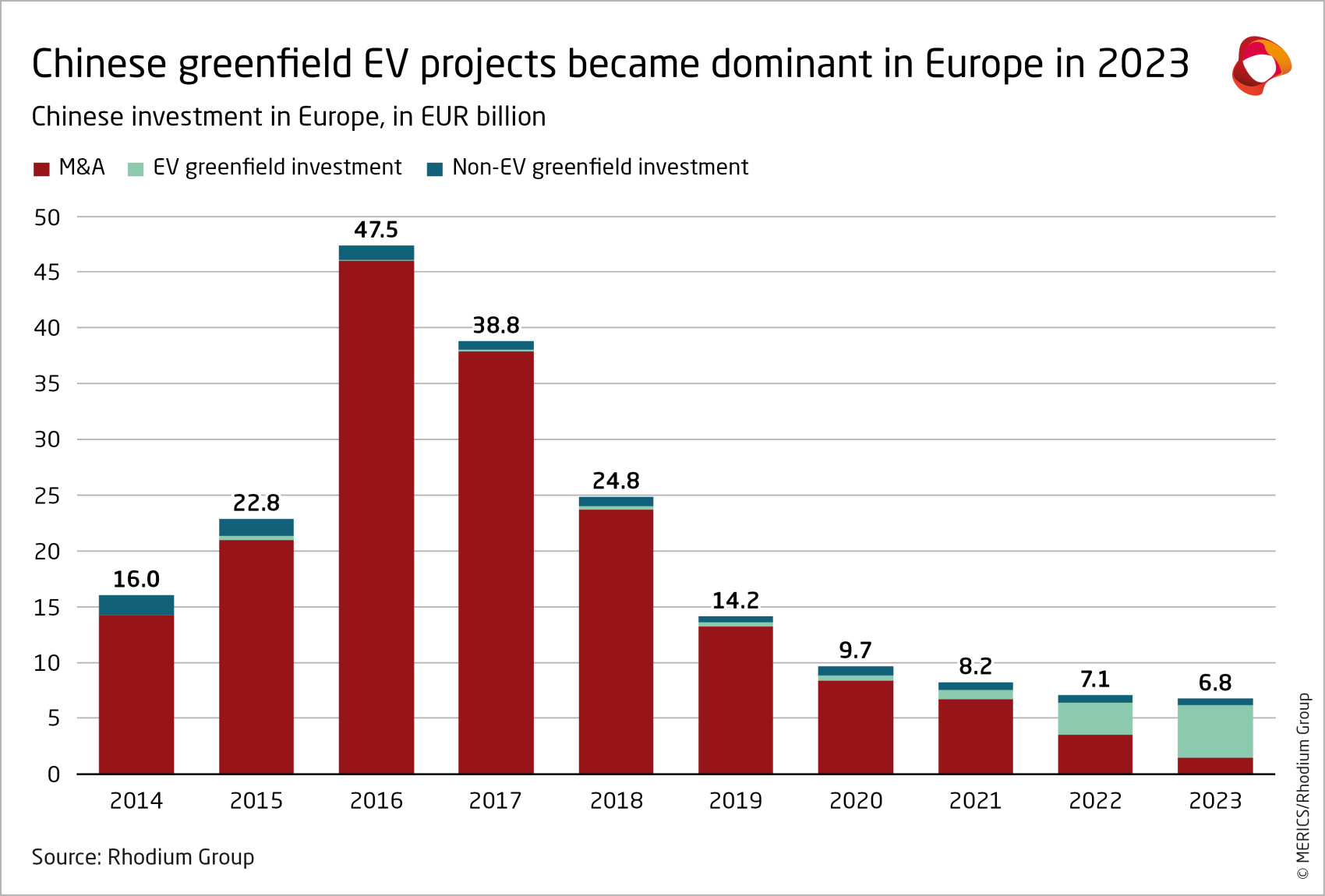
New MERICS & Rhodium Group report: Hungary emerges as main destination of Chinese investment in Europe
Berlin, June 6, 2024. According to a new report by the Mercator Institute for China Studies (MERICS) and Rhodium Group, Hungary received 44 percent of all Chinese foreign direct investment (FDI) in Europe in 2023, overtaking the “Big Three” economies Germany, France and the UK as the main recipient of Chinese investment. Hungary was a key recipient of investment in the electric vehicle (EV) sector, which attracted over two thirds (69 percent) of Chinese FDI in Europe. Overall, Chinese FDI in the region slipped further to EUR 6.8 billion and reached the lowest level since 2010.
These are some of the key findings of the report „Dwindling investments become more concentrated – Chinese FDI in Europe: 2023 update” published today on the latest trends in Chinese investment in the European Union and United Kingdom. According to the authors, there are various reasons for Chinese investments in Europe hitting a decade low in 2023: Uncertainty about the global economy impacted the investment environment for Chinese firms; China’s lackluster growth in the post-Covid period has weakened the financial footing of many Chinese firms; Strict capital controls and the depreciation of the Chinese yuan disincentivized outbound investment; And EU’s attempt to strike a balance between de-risking and cooperation in relations with China has stoked the uncertainties facing potential Chinese investors.
EV greenfield projects continue to dominate Chinese FDI
Mergers and acquisitions (M&A) kept tumbling: their value fell by 58 percent to just EUR 1.5 billion in 2023. It was the uptick in greenfield investment in the electric vehicle (EV) industry that kept Chinese investment levels in Europe from falling off a cliff in 2023. Greenfield investment shot up to 78 percent of the total to become the dominant form of Chinese FDI in Europe.
Beyond the EV industry, Europe’s healthcare, consumer products, entertainment, and the information and communication technology (ICT) sectors continue to appeal to Chinese investors. They attracted EUR 3 billion in annual Chinese FDI on average during 2021-2023 and now absorb about 70 percent of non-EV-related Chinese FDI in Europe.
Healthcare stands out as a sector that has attracted robust interest from Chinese investors in recent years. In 2023, it was the second most significant sector for Chinese investment in Europe. It was also a top destination for Chinese venture capital. Medical devices are a key area of interest, accounting for two thirds of investment in the healthcare sector between 2021-2023.
No significant recovery in sight
The drop in Chinese investment in Europe will continue to be cushioned by ongoing investment in the EV sector. But a substantial uptick is not expected. Instead, investment is likely to remain at low levels due to the weak financial positions of Chinese firms and increased government oversight in Europe. Chinese firms must also weigh up market opportunities in Europe against the backdrop of growing EU-China trade tensions.
Agatha Kratz, Director at Rhodium Group, comments on the findings: “This year’s report confirms the outmost importance of EVs in the EU-China trade and investment relations, but a key additional finding was the persistent strength of Chinese healthcare-related investment in Europe.”
Max J. Zenglein, Chief Economist at MERICS, says: “Greenfield projects continue to be a positive development, but the low level of Chinese investment in Europe are indicative of imbalances in economic ties.”
Study for download: “Dwindling investments become more concentrated – Chinese FDI in Europe: 2023 update”, by Agatha Kratz, Max J. Zenglein, Alexander Brown, Gregor Sebastian and Armand Meyer.
For interview requests for MERICS experts, please reach out to the communications team at MERICS: [email protected].
For interview requests for Rhodium Group experts, please reach out to [email protected].
Media Contact
The experts of the Mercator Institute for China Studies are available to comment on current news, as panelists or as op-ed authors.

